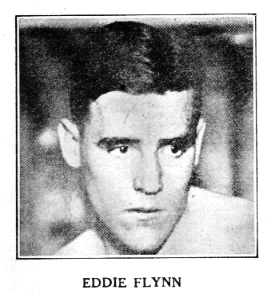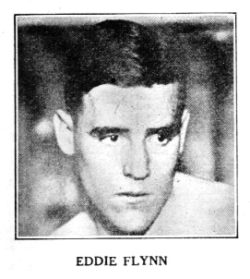Eddie Flynn
Eddie Flynn was considered by many to be the finest amateur boxer in the history of New Orleans.

Courtesy of Boxrec Boxing Encyclopedia
Eddie Flynn. Unknown
From working part time as a janitor while in college to winning a gold medal at the 1932 Olympics, New Orleanian Eddie Flynn was considered by many to be the finest amateur boxer in the history of a city that has given rise to many prized pugilists.
Born in Tampa, Florida, on October 25, 1909, Flynn came to New Orleans upon his acceptance at Loyola University as a dentistry student in 1929. There he joined the boxing team under legendary Coach Tad Gormley. As a junior, Flynn won the 1931 National Amateur Athletic Union (AAU) Welterweight Championship on April 30 at Madison Square Garden in New York City, defeating Joe Lyons from Buffalo, New York. Flynn’s younger brother, Dennis, also a member of the Loyola University boxing team, was runner-up in the middleweight division. Flynn climaxed an unbeaten senior year in 1932 by winning the first NCAA Welterweight Championship and repeating as the National AAU Welterweight Champion in Philadelphia, Pennsylvania, earning a berth on the 1932 US Olympic team.
With the world mired in the depths of the Great Depression, Los Angeles, California, was the only city to submit a bid to host the 1932 Summer Games. A total of sixteen boxers, the most in any weight division at the 1932 Olympics, competed in the welterweight division at the Grand Olympic Auditorium, built in 1924 and at the time the largest indoor arena in the United States, with a seating capacity of 15,300.
In the first three rounds, Flynn defeated Luis Sardella of Argentina, Dick Barton of South Africa, and Dave McCleave of Great Britain. In his fourth bout in five days, Flynn stepped into the ring to face a twenty-year-old German policeman named Erich Campe. It was all over in nine minutes after three furious rounds resulted in a 60–59 decision in favor of Flynn. He was one of two American boxers to take gold that year and was the nation’s last Olympic boxing champion until American fighters swept five gold medals at the 1952 Olympics in Helsinki, Finland.
After the Olympics, Flynn could not resist the lure of being paid to box. His first professional bout was against Harry Wallace at the old wooden Coliseum Arena in New Orleans on December 5, 1932, which Flynn won with a third-round knockout. A right to the jaw floored Wallace, who staggered to his feet just as referee Jimmy Moran had completed his ten-count. Flynn won his next two fights before losing a split decision to Curtis Mullens on March 27, 1933. It was Flynn’s first loss in 144 amateur and three professional fights. Flynn fought professionally until he entered the military service in 1935, compiling a pro record of twenty-nine wins, seven losses and two draws.
After World War II, Flynn returned to Tampa, where he used the money he had won as a boxer to establish his dental practice. He died in 1976 at the age of 66. Flynn was elected to the Loyola University Athletics Hall of Fame in 1964, the Florida Sports Hall of Fame in 1974, the Greater New Orleans Sports Hall of Fame in 1981, and the Florida Boxing Hall of Fame in 2010.
